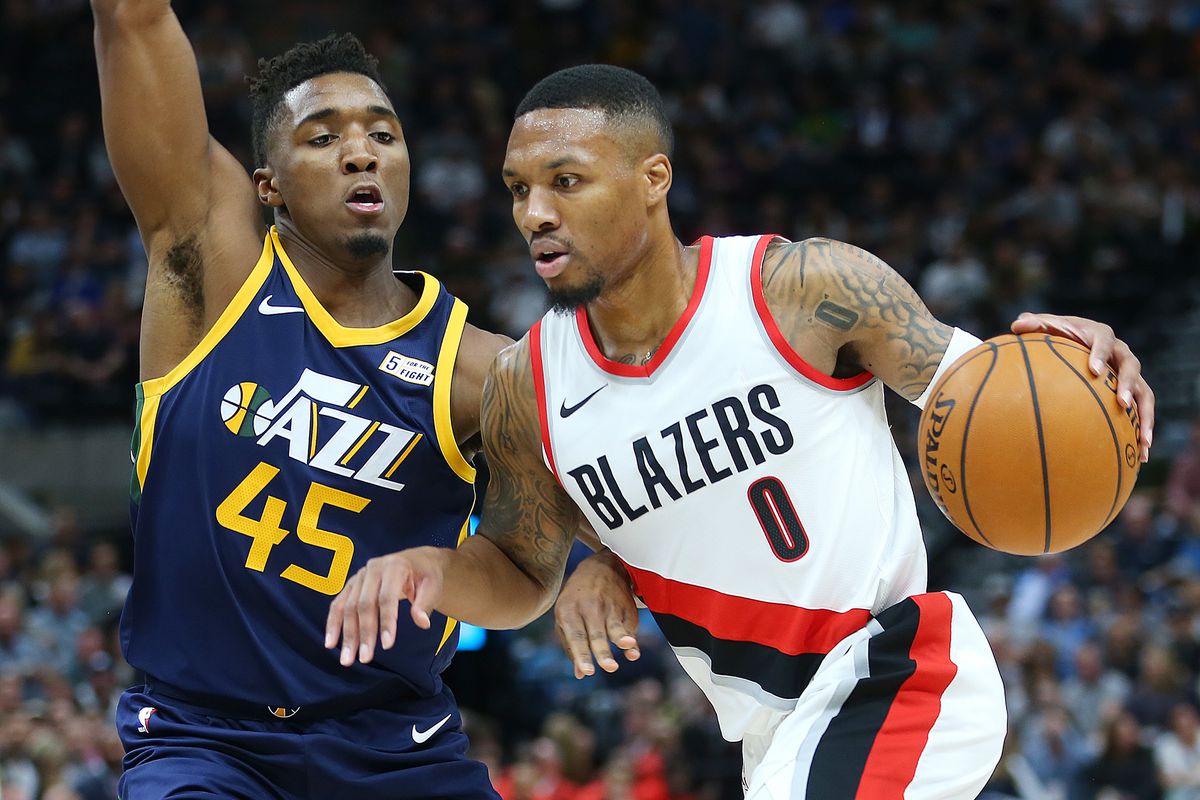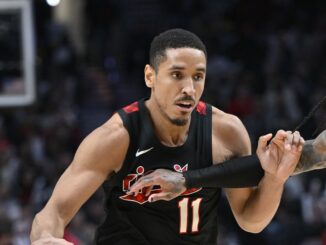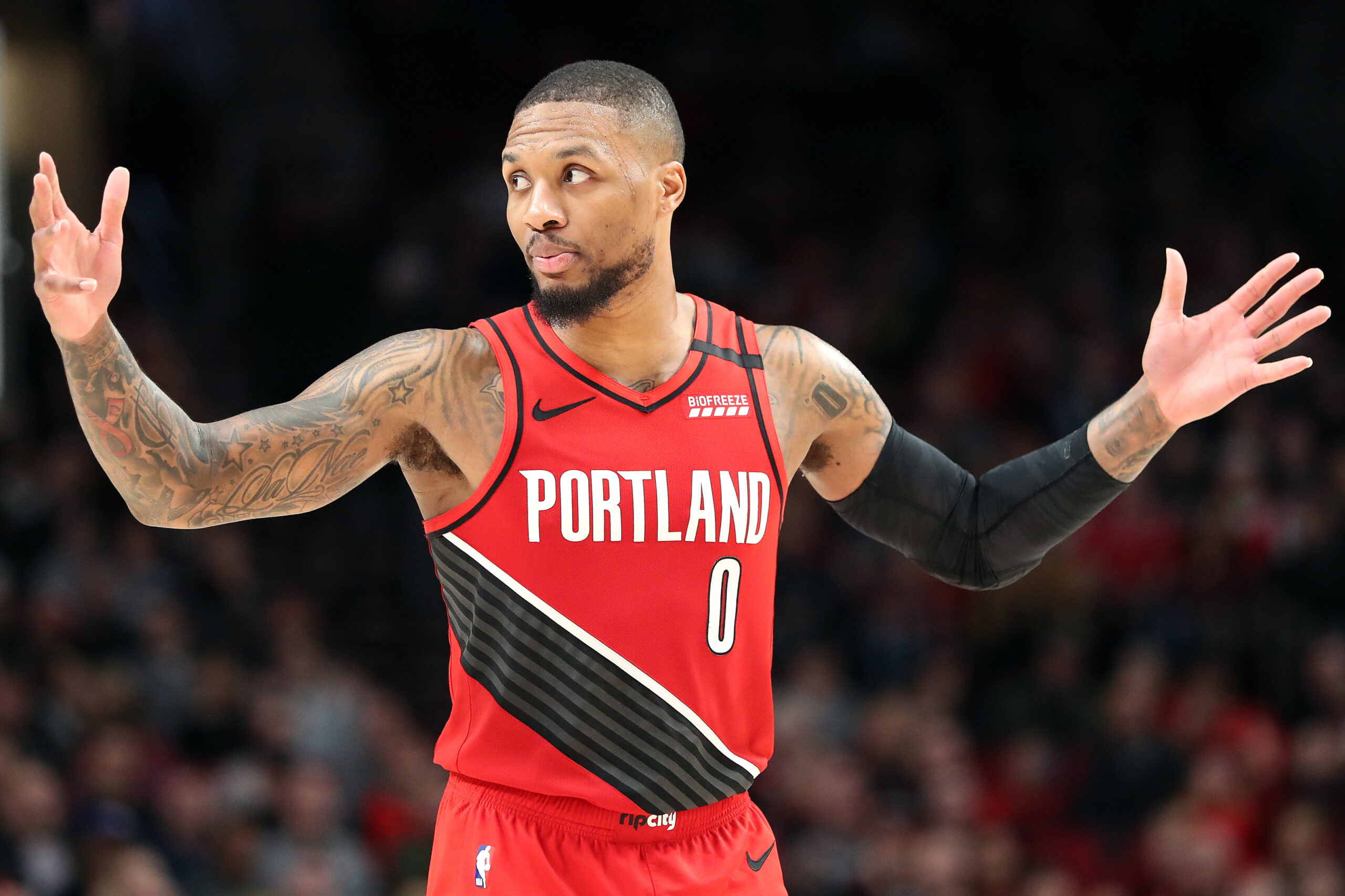
We are in the midst of the NBA Finals—a battle royale of the best two teams in the league for the NBA’s highest honor. The team we will be talking about today is not one of those two competitors.
No, the Portland Trailblazers fell way short of their stated goal of competing for a championship after bailing out of the first round in a gentleman’s sweep to the title favorite Los Angeles Lakers. In a series where some (looking at you, Charles Barkley) predicted a tough series for LeBron James and Anthony Davis, we instead got to watch the Lakers superstar duo pick apart the Portland defense piece by piece.
While it may seem a tad demoralizing, what the series revealed was a truth the Trail Blazers needed to accept: They are nowhere close to being in the same class as the best in the league.
Today, we’ll take a look at what the front office needs to do to get superstar Damian Lillard a real chance at competing for a championship ring.
Offense
During the normal, pre-Covid version of the NBA, the Trail Blazers ranked 6th in overall offensive efficiency in the league, averaging 115 points per game, per basketball-reference.com. While a good finish, it is nowhere near what their potential is. In the NBA Bubble, Portland averaged a robust 126 points per game as a unit. That is an astounding, nuclear type number that can (and did) melt the tippity top defenses in the league.
All-NBA superstar Damian Lillard is the engine, leader and identity of this offense. He was un-freaking-stoppable in the eight seeding games as he blitzed defenses to the tune of 32.5 points per contest. Flanking him on the wing was the perennially underrated CJ McCollum and former scoring champion Carmelo Anthony, with big men Jusuf Nurkic and Zach Collins operating as the beef inside the paint. It’s a starting five that every team fears, as Lillard’s near-unlimited range opens gaping holes for his teammates all over the place. It’s the side of the ball that you wouldn’t think GM Neil Olshey would have to worry about.
Except… this same offense was stonewalled by the Lakers as they held Portland to 106.6 points per game. How? The easy answer is depth and injuries, a problem that cropped up and led to their lackluster regular season. Starting power forward Zach Collins went out injured before the playoffs even began. That forced the team to introduce emerging talent Gary Trent Jr into a more permanent role and lead to the team having to reach deeper into its bench to fill minutes. The two reserves forced to play the most were the talented but ever disappointing Mario Herzonja and the talented but ever disappointing Hassan Whiteside to try and buy minutes to allow starters to rest.
This led to less than ideal results as both were eaten alive Lebron James and Anthony Davis for large chunks of time. While one could argue that they could be in better shape by default next season with the return of some key reserves, that is not guaranteed. Scoring forward Rodney Hood will try to return from a torn Achilles and Trevor Ariza will be forced to stave off yet another year of aging after sitting out the bubble games. Both stand as question marks and in no way guarantee a higher standard of play.
As talented as Lillard and McCollum are, they are still an undersized duo prone to wearing down in the playoff crucible. It was blatant how bone tired Lillard was after game one of their series with the Lakers, clearly fatigued after having to carry his entire team through the seeding games. That’s not even considering the hamstring issue that forced Lillard to sit out the last two games of the series nor CJ McCollum’s broken back he attempted to play through. It is difficult enough for the two of them to carry the offensive load, the fact they are racking up so much extra mileage makes it nearly impossible for them to be at peak effectiveness in the postseason when it matters most.
They need a third star. Jusuf Nurkic is close. A devastating at-rim finisher and deadly passer in the pick-n-roll, Nurkic is a great partner for both Lillard and McCollum in the two-man game. But he doesn’t create shots—for himself or others. He’s not taking anyone off the dribble, limiting his offensive gravity as a defenses key in on the Blazers’ star duo.
What Portland truly needs is a forward-size creator that not only can take some of the on-ball reps from Lillard, but who can also attract defensive attention from the NBA’s best defenders and (ideally) hit the occasional three-pointer.
Unfortunately, these types of players are the rarest commodity in the NBA. A player like a Jaylen Brown, Paul George, or even OG Anunoby would be ideal fits. But those players aren’t going anywhere and there are very few players in that mold that are even considered available. Potential free-agent fits could be a Jae Crowder-type who is a willing-but-iffy three-point shooter who won’t hinder an offense. Those players aren’t perfect, though, and are available for a reason. If the ball comes to him, he can shoot, pass or drive but he is not going to set the table for one of his teammates.
A trade may make more sense. Aaron Gordon could be a nice option, but he too has a spotty shot. Bradley Beal is probably too small and Ben Simmons would be too pricey considering the assets Portland possesses. Which should answer why Portland has struggled to fill this void at forward. It’s a weakness shared by many others in the league, making it a struggle to improve with the resources the Blazers have at their disposal.
While Lillard and McCollum are easily good enough to generate a top-five regular-season offense, their liabilities in the playoffs make them exposable by the best teams. Until they get a third, larger ball handler, this will continue to be one of their biggest flaws.
Defense
While the offense is one key piece from getting the team where where it needs to be, the defense has to take leaps to get up to championship quality. In the regular season, they allowed opposing teams to score 116.1 points per game, according to basketball-reference.com. That mark was good for 26th in the league and primed to be exploited by any semi-decent offense it faced.
One could argue that missing Nurkic and Collins was a big reason why the Blazers defense struggled. That argument loses weight when considering they were a basement-dwelling unit even when they returned for the NBA Bubble. Portland’s defense was actually worse, giving up a ghastly 123.4 points on average in its seeding games. That’s a repulsive number and was the key reason why the Lakers simply pushed them aside en route to the finals.
There are a ton of issues, ranging from their miniature backcourt to its slow, oversized frontcourt. But the biggest, most glaring issue is that there is no one on the Blazers roster that can even act like they can guard a star forward.
This list includes LeBron James, Kawhi Leonard, Luka Doncic, Jayson Tatum, Paul George, Giannis Antetokounmpo, among others. Those are the players of consequence in this league and if you don’t have anyone to guard them, your team will be in trouble…quick. All Portland has is Gary Trent Jr (who has just completed his first season as a contributor), Mario Herzonja (who has never been good) and the corpse of Carmelo Anthony. If they choose to bring Trevor Ariza back on his team option, he is at least the outline of that type of player, but it’s been a longtime since he has been able to hang regularly on defense with the best in the NBA. To really take a step up at that end of the floor, they need to bring in a real defensive presence that makes those players have to work.
Ideally this player type would be 6’6-6’9 with a long wingspan. Upcoming free agents who meet this description on defense includes Danilo Gallinari, Marcus Morris, James Johnson, Solomon Hill, Maurice Harkless, Andre Roberson, Jae Crowder, Justin Holiday and Wes Matthews. If Portland chooses to pick up Ariza’s option, they’ll be committed for $114,113,901 in player salaries. The official number has not come out yet, but the projected salary cap is $115 million, meaning Portland has very little room to maneuver. They can go over that number and into the tax, as well as use Kent Bazemore’s $7,000,000 trade exception to bring a player in. With those projections, Danilo Gallinari and Marcus Morris will be off the table because they will draw a much higher price tag. Out of the remaining options, bringing in a Jae Crowder (who just helped the Heat stonewall Giannis and Tatum in the playoffs) or a return of Wes Matthews or Maurice Harkless would be their best-case scenario. They operate as net positives on the defensive end of the floor without taking much off the table offensively. The problem is how much of a plus they really are, and whether it is enough to be the difference in winning a playoff series or not.
The other option is for Portland to acquire this player type through a trade. There are probably two likely candidates who will be available this offseason, but neither are perfect. Aaron Gordon, who we have already discussed, is a versatile, athletic defender built to hang with like-size players. At 6’8, 235 lbs, Gordon would add some much-needed teeth to the Blazers defense.
The other player who would be available is Tobias Harris and his ghastly contract. While easily overpaid, Tobias is a long, tall defender who can disrupt offensive stars. While he is not stuffing the defensive stat sheet (.6 blocks and .8 steals per game) he’s got the size that the Blazers need. He would provide much, much more on offense, but what he gives on defense is something Portland desperately could use as well.
What It All Means
The Blazers are a good, fun, thrilling team to watch. But they aren’t championship quality as recent history proves. They got beat in five by the Lakers this year, got swept by the Golden State Warriors in 2018 and were swept by the Anthony Davis Pelicans the year before that.
The common theme is that those teams were led by or had huge contributions from forward-sized stars.
The Blazers’ in-house options leave a lot to be desired, and with Damian Lillard and CJ McCollum in their primes the Blazers need someone to help slow down those guys now. They have a couple young players in Anfernee Simons and Gary Trent Jr who could be enticing to some teams, and the team also controls all of its future first-round picks.
Portland needs a defensive small or power forward who can hold his own on both sides of the ball and it won’t be able to get a good enough one in free agency. The Blazers are a team of talented ball handlers and solid big men but are missing a player who can properly link these two parts of the roster effectively.
It’s time to package what assets they have and go out and get a good forward—or risk this team being remembered as a cute upstart rather than a feared juggernaut.



